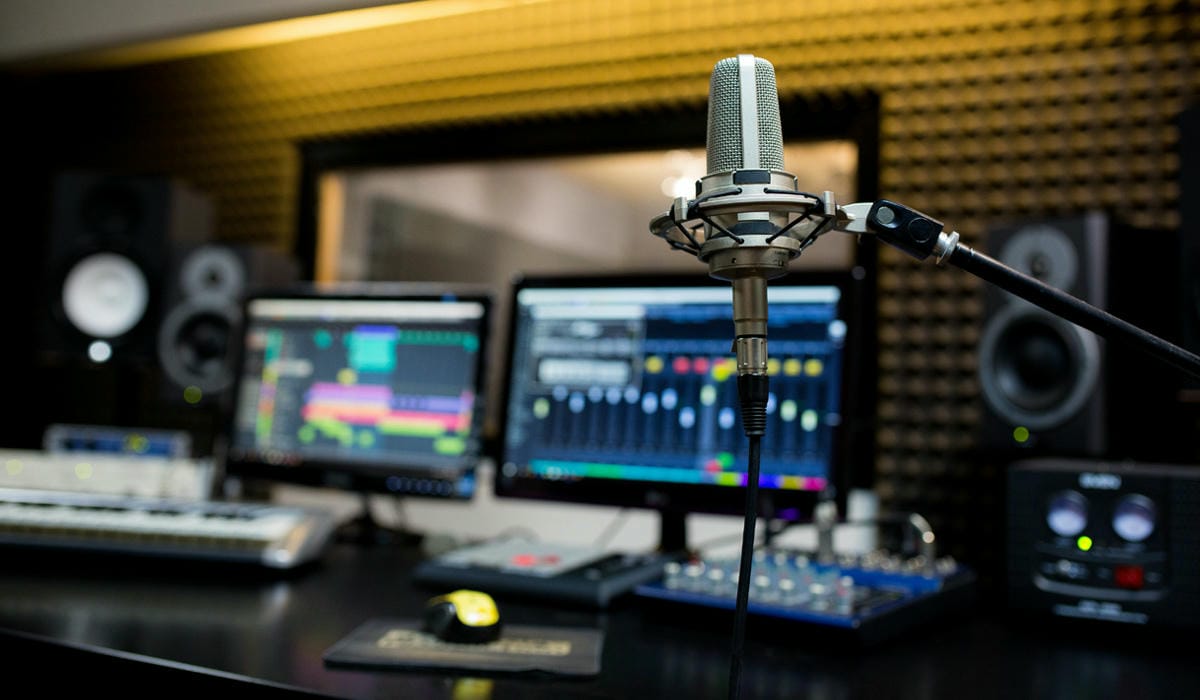
How to Start a Radio Station: Step-by-Step Guide for 2025
Starting your own radio station can be an exciting and rewarding venture, whether you're passionate about music, talk shows, or building a brand around your voice. But success requires more than just enthusiasm. You need the right tools, strategies, and a clear understanding of how to launch and grow your station.
This three-part guide walks you through every step of the process, from startup to on-air success:
Chapter 1 covers the essential steps to launching a radio station, including choosing your broadcast method, conducting market research, securing funding, and building your audience.
Chapter 2 dives into the equipment and software you'll need, whether you're setting up a simple home studio or a full-scale terrestrial operation.
Chapter 3 shares expert tips on radio programming to help you create engaging, consistent content that keeps listeners coming back.
Let's get started!
Table of Contents
Chapter 1
How to Start a Radio Station: Step-by-Step Guide
Why Start a Radio Station?
How to Start a Radio Station in 10 Steps
1. Choose Your Broadcast Method
2. Conduct Market Research
3. Understand Your Startup Costs
4. Develop a Business Plan and Secure Funding
5. Navigate Licensing and Regulatory Requirements
6. Purchase Necessary Equipment and Set Up Your Studio
7. Develop Programming for Your Audience
8. Hire Staff and On-Air Talent
9. Build Awareness and Attract Your First Listeners
10. Launch and Grow an Engaged Audience
Your Next Step: Getting Equipped to Go Live
Chapter 2
Software and Equipment for Broadcasting Your Radio Station: Here's What You Need
Chapter 3
Radio Programming: Seven Keys to Captivating Your Audience
Table of Contents
Chapter 1
How to Start a Radio Station: Step-by-Step Guide
Why Start a Radio Station?
How to Start a Radio Station in 10 Steps
1. Choose Your Broadcast Method
2. Conduct Market Research
3. Understand Your Startup Costs
4. Develop a Business Plan and Secure Funding
5. Navigate Licensing and Regulatory Requirements
6. Purchase Necessary Equipment and Set Up Your Studio
7. Develop Programming for Your Audience
8. Hire Staff and On-Air Talent
9. Build Awareness and Attract Your First Listeners
10. Launch and Grow an Engaged Audience
Your Next Step: Getting Equipped to Go Live
Chapter 2
Software and Equipment for Broadcasting Your Radio Station: Here's What You Need
Chapter 3
Radio Programming: Seven Keys to Captivating Your Audience
Why Start a Radio Station?
Starting a radio station gives you the power to share your voice, passions, and perspectives with the world through a uniquely personal platform. Whether your focus is music, community news, religious programming, or brand storytelling, radio remains one of the most influential media channels, reaching about 82% of U.S. adults weekly.
Digital tools have opened the door for individuals and small teams to broadcast globally without needing costly studios or FCC licenses. As a result, online radio continues to grow, with listeners spending an average of 974 minutes per month tuning in digitally.
From independent broadcasters and churches to schools and startups, radio is an effective way to engage audiences, promote services, and build brand recognition. With low startup costs, scalable tools, and opportunities for advertising and sponsorship revenue, modern radio is more accessible – and more valuable – than ever for creators and entrepreneurs alike.
How to Start a Radio Station in 10 Steps
Getting started can be the toughest part, but that's what we're here for. Whether you're launching a hobby station or aiming for a professional setup, these steps will help you bring your radio vision to life.

1. Choose Your Broadcast Method
Before diving into market research or business plans, your first decision should be choosing how you'll reach listeners. This choice affects every other aspect of your radio station, from costs to licensing requirements.
Internet Radio: The Smart Starting Point
Online radio uses internet streaming rather than land-based transmission, allowing you to reach a global audience without FCC licensing or expensive transmission equipment. It’s a fast, flexible, and low-barrier way to get on the air.
Key advantages:
Global reach through any internet connection
No geographic limitations
Lower startup and operational costs
Launch within days or weeks, not years
Test your format before a major investment
Many terrestrial broadcasters also simulcast their programming online to expand their reach. Even if your long-term goal is FM or AM, starting with an internet-only station is a strategic, cost-effective way to refine your format and grow your audience.
Traditional FM/AM Broadcasting
Terrestrial radio relies on land-based transmitters to reach listeners in a specific geographic area. While powerful for local reach, it comes with higher startup costs and stricter regulatory hurdles.
Consider FM/AM if you:
Have substantial funding secured
Need local market penetration
Can navigate regulatory requirements
Have access to transmission sites
Some of the most successful radio networks – including AccuRadio and Big R Radio – began as online stations and now stream dozens of genre-specific channels. Whether you start online or aim for FM/AM, the right broadcasting method sets the foundation for your station’s long-term success.

2. Conduct Market Research
Before you invest in equipment or map out your programming, take time to understand your audience and the market landscape. Solid research helps you choose the right format, attract listeners, and stand out from competing stations.
Understand Your Audience
Your first goal is to identify who you're broadcasting to and what they care about. This goes beyond age or location – it includes their preferences, problems, and listening routines.
Use tools like:
Nielsen Audio or Statista for listener behavior trends
Think with Google for audio consumption insights
Social media and podcast analytics for topic demand
Website surveys or tools like Typeform to test interest in your format
U.S. Census Bureau or local demographic data to understand population segments
Try to answer:
What content do they already listen to?
When and how do they listen (AM, FM, online)?
What other media do they trust or engage with?
This data will help you shape your station’s format and broadcasting method around real listener habits.
Analyze Your Competition
Identify other stations – local or online – that serve a similar audience. Listen to their programming, explore their websites, and follow their social media. Look for:
What genres or topics they focus on
How they engage listeners
How often they broadcast and what their schedule looks like
This will help you pinpoint what they do well – and more importantly, where they fall short. Those gaps are your opportunity to offer something fresh.
Define Your Angle
With your research in hand, clarify what makes your station different. Will you offer an underrepresented genre? A local focus that other stations ignore? A unique tone or voice?
Defining your angle helps you build a brand that resonates. When listeners and advertisers know what you stand for, they're more likely to stick around.
3. Understand Your Startup Costs
Knowing your financial requirements early on is crucial for planning and securing the funding needed to launch and sustain your station.
Online Radio Station Costs
Broadcasting software/platform: $100-$500/month
Basic studio equipment: $2,000-$5,000
Music licensing: $500-$2,000/year
Website and hosting: $500-$2,000/year
Marketing budget: $5,000-$10,000/year
First-year operations: $3,000-$5,000
FM/AM Station Costs
These ranges vary significantly based on market size, equipment quality, and whether you're buying or leasing facilities.
FCC licensing and legal fees: $10,000-$50,000
Transmitter and antenna: $30,000-$150,000
Studio construction: $50,000-$200,000
Tower lease/construction: $20,000-$500,000
Professional equipment: $50,000-$150,000
First-year operations: $100,000-$300,000
💡 Cost ranges depend on setup and scale:
Online stations are leaner and cheaper to launch. FM/AM stations require major infrastructure, legal support, and equipment, especially in larger markets.

4. Develop a Business Plan and Secure Funding
A strong business plan lays the foundation for your station's success. It clarifies your goals, attracts potential funders, and keeps your operations focused as you grow.
Radio Station Business Plan Components
A well-structured radio station business plan typically includes the following components:
Executive summary – What your station is, who it's for, and what makes it unique
Company overview – Legal structure, ownership, location (physical or virtual)
Programming and revenue model – Your content format(s), advertising strategy, syndication plans, and income streams (ads, sponsorships, events, merchandise)
Operations plan — Staffing, equipment, studio setup, licensing, automation tools
Marketing and audience strategy – How you'll grow your listener base and brand
Financial projections – Startup and ongoing costs, expected revenue, breakeven timelines
Funding request – How much you need, how it will be used, and projected return
Funding Your Radio Station
Your business plan helps you identify the funding required to launch and stay afloat while you build an audience. For online stations, startup costs are lower, which can make funding more accessible. FM/AM stations will need more substantial capital to cover equipment, licensing, and physical infrastructure.
Potential funding sources:
Personal savings or credit (separate from business finances)
Friends and family loans
Small business loans or lines of credit
Crowdfunding platforms (especially for niche or community-focused stations)
Angel investors or media-focused VCs
Grants (check for arts, media, or local business development funds)
Before approaching funders, consider working with an accountant to refine your projections and demonstrate financial sustainability. Highlight how your format, audience, and monetization plan set your station up for long-term success – and emphasize the cost-efficiency of online radio if applicable.

5. Navigate Licensing and Regulatory Requirements
Before you hit "broadcast," it's essential to ensure your station is legally compliant. Whether you're launching an online station or a terrestrial FM/AM station, licensing requirements vary – and getting this step right protects you from fines, takedowns, and legal risks. It also sets your station up for long-term success.
Licensing for FM/AM Broadcasters (FCC)
If you're launching a terrestrial station, the Federal Communications Commission (FCC) oversees licensing to ensure stations don't interfere with each other's frequencies. But securing a license isn't quick or guaranteed.
Here's what to know:
FCC application windows aren't always open — You may need to wait for the next official filing period, which can take years in some markets.
Approval takes time — Applications can take 6–18 months (or longer) to process.
Construction permits are required before you build or buy — The FCC strongly advises that you don’t purchase any broadcast equipment until you’ve been granted a permit.
Unlicensed broadcasting is illegal — Even low-power transmissions can result in steep fines and criminal penalties.
Because the process is complex and competitive, it’s a good idea to work with a radio attorney or engineering consultant. They can help you navigate technical requirements, file paperwork accurately, and improve your chances of success.
���💡 What about Low Power FM (LPFM)?
If you're building a community-based, non-commercial station, LPFM might be a more accessible option:
Up to 100 watts (approx. 3.5-mile broadcast radius)
Lower equipment costs and a simpler application process
Strictly non-commercial use only
Music Licensing for Online and Terrestrial Stations
Regardless of whether you're broadcasting online or over the air, you'll need the proper music licenses to play copyrighted content legally. These licenses ensure artists and rights-holders are compensated when their work is played.
The four major organizations that handle U.S. music licensing are:
ASCAP – Covers millions of songs; fees based on revenue
BMI – Similar to ASCAP, but with different fee structures
SESAC – Smaller catalog, invitation-only
SoundExchange – Required for all digital streaming (online radio)
Online stations don't require FCC approval, which makes them faster and less costly to launch. But they're still subject to copyright laws. You'll need to secure music licenses and ensure compliance with the laws of the countries you're broadcasting from and to, especially if your stream reaches international listeners.
Platforms like Live365 simplify this by bundling U.S., Canada, Mexico, and U.K. music licenses into their service. If you're broadcasting through Live365, you're already covered in those regions. Without that kind of bundled coverage, you'd need to license directly with each organization.

6. Purchase Necessary Equipment and Set Up Your Studio
Once you've handled licensing and business planning, it's time to bring your station to life by purchasing the required equipment and selecting the right studio location. Whether you're launching an online station or a terrestrial AM/FM operation, these decisions form the technical foundation of your station.
Equipment For Online vs. AM/FM Radio Stations
Your equipment needs depend on your broadcasting method. Online radio is more affordable and flexible, while FM/AM broadcasting requires significant investment in hardware and infrastructure.
Online Radio Station Equipment:
Reliable internet connection
Computer or laptop
Broadcasting software
Microphones (USB or XLR)
Audio playback devices
Audio recording/editing software
Streaming servers and encoders
Music or content libraries
AM/FM Radio Station Equipment:
Transmitters and antennas
Towers and guy wires
Power supplies and backup generators
Professional-grade studio gear
Audio automation and playback equipment
Remote control and monitoring systems
If you're on a tight budget or just starting, online radio is often the smarter choice, requiring fewer upfront costs and offering faster setup.
Choosing Your Studio Location
Where you set up your studio plays a big role in your audio quality and budget. For online stations, a home studio is often the most practical and affordable choice, giving you full control without the expenses of a commercial space. Ideally, pick a quiet, well-ventilated room with good acoustics and a strong internet connection.
Thanks to cloud-based tools and automation features from platforms like Live365, you can easily manage your station remotely, adding flexibility while keeping overhead low.
If you're planning an FM/AM station or expect to grow with in-person staff or live guests, renting or building a dedicated studio might be a better fit. Look for spaces with minimal outside noise, reliable power, and enough room to accommodate your on-air talent, producers, and equipment.

7. Develop Programming for Your Audience
After purchasing equipment, you can begin developing your programming format and content, hiring staff, and planning your broadcasting schedule.
Choose a Radio Station Format
Your radio format determines the type of content you broadcast and helps attract and retain your ideal audience. Formats can include:
Music genres: pop, rock, classic rock, country, hip-hop, classical, nostalgia (oldies), regional (e.g. Latin genres), religious
Talk-based: news, sports, political commentary, educational, interviews
You don't have to stick to one format. Many stations assign different formats to specific time blocks or days. The key is aligning your programming with your audience's interests and habits.
Use Syndicated Media
If you’re not producing 100% original content, syndicated programming is a great way to add variety and professionalism to your lineup, especially when you're just starting out or building your content library.
Here are some syndication options:
News and sports: Westwood One (affiliated with Cumulus Media) provides popular newscasts and sports updates.
Music: Reach out to local record labels, music promoters, or use professional music services that offer pre-licensed tracks for radio airplay.
Talk shows and countdowns: Many networks offer ready-to-air specialty programming that fits a variety of formats.
Always make sure you have the proper rights or contracts in place before rebroadcasting any syndicated content.
Automate Your Broadcast With Cloud Tools
Gone are the days when you needed to be in the studio 24/7. Cloud-based broadcasting and automation software allows you to run a professional station with a lean team, or even solo.
With automation, you can:
Schedule content days or weeks in advance
Seamlessly toggle between live and pre-recorded content
Broadcast from anywhere with an internet connection
Lower your operational costs and reduce energy usage
Automatic backups and failover protection
Key features broadcasters should look for:
Playlist rotation with music scheduling rules
Pre-recorded show scheduling and replay
Automatic announcements (e.g., time, weather, or promotions)
Commercial insertion and spacing based on ad inventory
Power Your Station with Live365
Ready to simplify scheduling, automation, and licensing? Live365 offers an all-in-one platform to help you launch and manage your station with ease. From automated playlists to built-in ad tools and licensing coverage, everything you need is in one place.
Start your station with Live365

8. Hire Staff and On-Air Talent
For online stations, it's possible to start as a one-person operation. But as your audience grows, your need for support will grow. FM/AM stations typically require a larger team right from the start.
Key roles to consider:
Producers – Plan and coordinate your programming.
On-air talent – Hosts, DJs, and personalities that bring your station to life
Broadcast engineers – Handle technical setup and troubleshoot issues
You'll also need to decide how much of your station will be live vs. automated. Many stations use automation software to schedule content and fill programming gaps, helping you maintain a 24/7 presence without hiring round-the-clock staff.

9. Build Awareness and Attract Your First Listeners
Getting your station off the ground is only half the challenge – the next step is attracting listeners and building long-term awareness. Promotion and marketing play a key role in your success, especially in the early stages.
Set Your Marketing Budget
As a general rule, allocate 20–30% of your projected revenue toward marketing during the startup phase. Once your station is more established, this can typically be reduced to 5–7%. A solid marketing plan helps build awareness, grow your audience, and attract potential advertisers and sponsors to support your operations.
Choose Your Marketing Channels
A well-rounded marketing strategy combines organic growth with paid promotion. Consider the following tactics to get your station in front of the right audience:
Build a professional website with a built-in streaming player
Create branded social media profiles across key platforms
Run targeted PPC and social media ad campaigns
Partner with local businesses, schools, or nonprofits for cross-promotion
Recruit advertisers early to help offset marketing costs
Set up content distribution partnerships or placement in directories
Host contests or giveaways to boost engagement
Connect With Advertisers
Building relationships with advertisers not only generates revenue but also extends your promotional network. You can pursue:
Direct ad sales to local or niche businesses
Sponsorships for shows, segments, or events
Programmatic advertising that automatically serves ads tailored to your listeners' demographics and interests
Live365 offers built-in monetization tools that simplify ad management, including automated ad insertion through exchanges and trading desks.
Find Distribution Opportunities
To expand your reach, get your station listed on major platforms and devices. Live365 helps you access listeners everywhere, including:
Web and mobile apps
Smart TVs, Alexa, and voice assistants
Premium distribution partners TuneIn and iHeartRadio
This kind of automated distribution allows you to grow beyond your immediate network and reach millions of listeners in the U.S., Canada, Mexico, and the U.K.

10. Launch and Grow an Engaged Audience
With your broadcast and promotional plans in place, it's time to go live and start building your listener base.
Generate Buzz Around Your Launch
A strong launch helps establish early momentum. Consider celebrating with:
A virtual or in-person launch event
Guest appearances (local influencers or musicians can help draw attention)
On-air giveaways or contests
Collaborations with community organizations or small businesses
These launch tactics give people a reason to tune in and share. This excitement, paired with a well-written, engaging press release detailing the launch activities, is often a strong way to get eyes and ears on your station launch.
Collect Feedback From Your Listeners
Feedback is critical to refining your programming and increasing retention. Use these strategies to learn what your audience loves – and where you can improve:
Run listener surveys via email or social media
Invite call-ins and live feedback during shows
Use platform analytics (like Live365’s built-in stats dashboard) to track engagement
Monitor what time slots, segments, or genres perform best
By listening to your audience, you'll continuously improve your content and keep them coming back.
Keep Listeners Engaged and Coming Back
Consistent audience engagement builds loyalty and word-of-mouth growth. Try:
Holding regular giveaways or contests
Sponsoring or promoting local events
Running joint promotions with businesses, artists, or sports teams
Supporting charitable causes or broadcasting from community events
Offering listener shout-outs or call-in opportunities during live shows
These community-driven efforts not only boost engagement but also strengthen your brand identity.
Monetize Your Radio Station
Once you've built a stable audience, you can expand your monetization strategy. Common options include:
Automated ad insertion (handled by platforms like Live365)
Sponsorship packages with local or national brands
Direct ad sales for more control and revenue share
Memberships or crowdfunding to involve your audience in supporting your station
With Live365's ad tools, you can schedule ads to run at specific intervals (e.g., every 30 minutes) while the platform handles delivery and optimization, giving you more time to focus on content.
Your Next Step: Getting Equipped to Go Live
Launching a radio station begins with big-picture planning – defining your goals, understanding your audience, securing licenses, and setting up the systems that will keep everything running. By this point, you should have a clear sense of how your station will operate and what it will take to bring it to life.
Next comes the hands-on phase: choosing the right equipment. In Chapter 2, we'll walk through the tools that power a functioning studio, from basic hardware to broadcasting software. Whether you're starting with a lean home setup or building out a professional space, this next chapter will help you make informed, cost-effective choices.